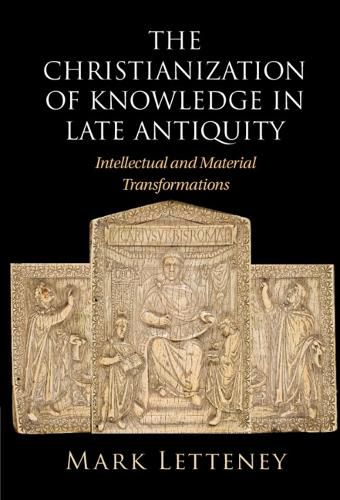Readings Newsletter
Become a Readings Member to make your shopping experience even easier.
Sign in or sign up for free!
You’re not far away from qualifying for FREE standard shipping within Australia
You’ve qualified for FREE standard shipping within Australia
The cart is loading…






The Christianization of Knowledge in Late Antiquity: Intellectual and Material Transformations traces the beginning of Late Antiquity from a new angle. Shifting the focus away from the Christianization of people or the transformation of institutions, Mark Letteney interrogates the creation of novel and durable structures of knowledge across the Roman scholarly landscape, and the embedding of those changes in manuscript witnesses. Letteney explores scholarly productions ranging from juristic writings and legal compendia to theological tractates, military handbooks, historical accounts, miscellanies, grammatical treatises, and the Palestinian Talmud. He demonstrates how imperial Christianity inflected the production of truth far beyond the domain of theology - and how intellectual tools forged in the fires of doctrinal controversy shed their theological baggage and came to undergird the great intellectual productions of the Theodosian Age, and their material expressions. Letteney's volume offers new insights and a new approach to answering the perennial question: What does it mean for Rome to become Christian? This title is also available as Open Access on Cambridge Core.
$9.00 standard shipping within Australia
FREE standard shipping within Australia for orders over $100.00
Express & International shipping calculated at checkout
The Christianization of Knowledge in Late Antiquity: Intellectual and Material Transformations traces the beginning of Late Antiquity from a new angle. Shifting the focus away from the Christianization of people or the transformation of institutions, Mark Letteney interrogates the creation of novel and durable structures of knowledge across the Roman scholarly landscape, and the embedding of those changes in manuscript witnesses. Letteney explores scholarly productions ranging from juristic writings and legal compendia to theological tractates, military handbooks, historical accounts, miscellanies, grammatical treatises, and the Palestinian Talmud. He demonstrates how imperial Christianity inflected the production of truth far beyond the domain of theology - and how intellectual tools forged in the fires of doctrinal controversy shed their theological baggage and came to undergird the great intellectual productions of the Theodosian Age, and their material expressions. Letteney's volume offers new insights and a new approach to answering the perennial question: What does it mean for Rome to become Christian? This title is also available as Open Access on Cambridge Core.